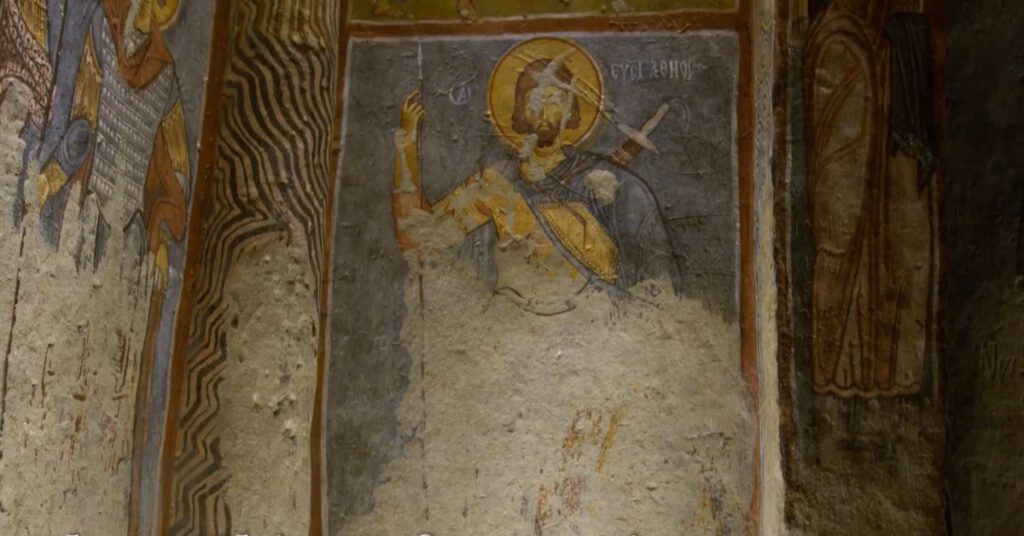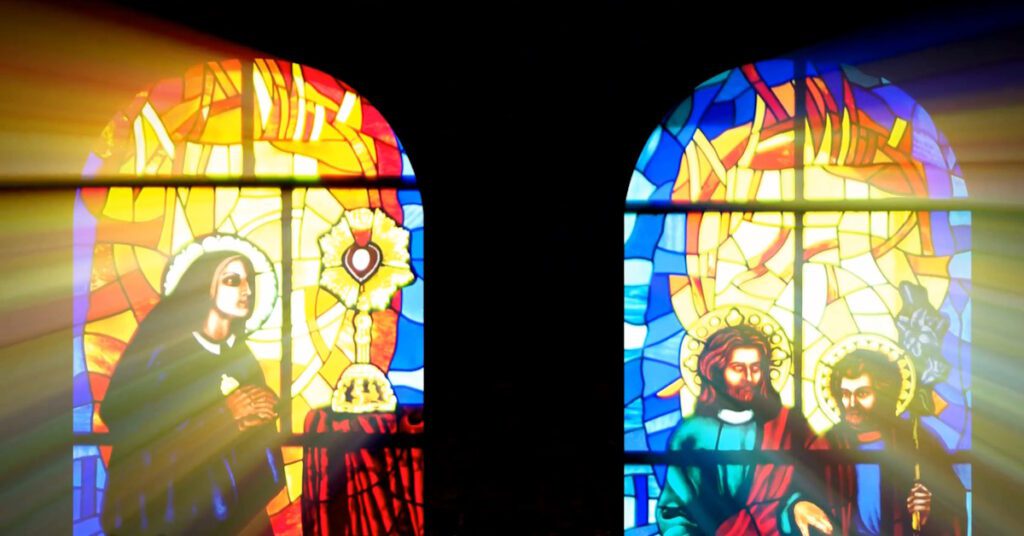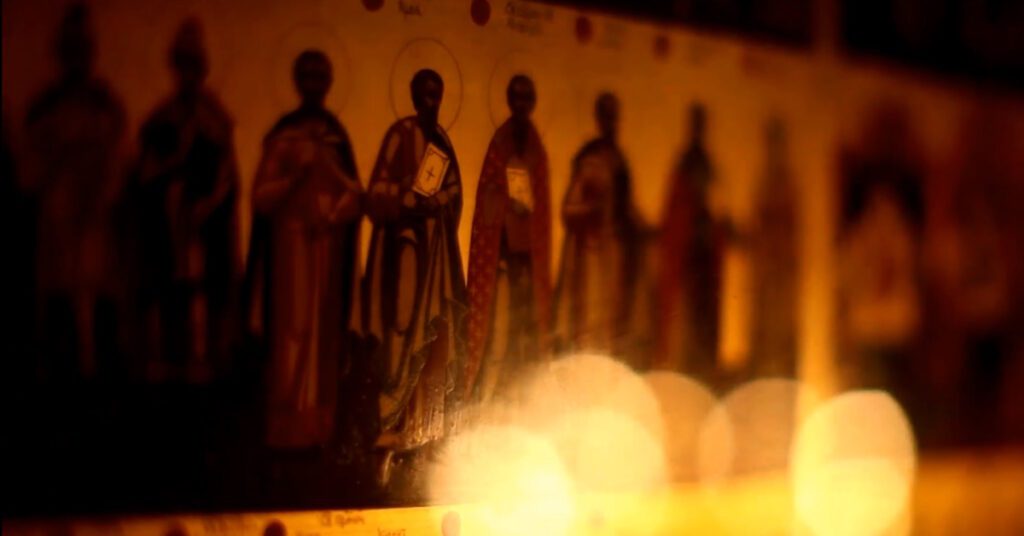In the heart of Byzantium, during a time when the sacred and the worldly were deeply intertwined, a young man named Symeon embarked on a journey that would forever alter his destiny.
Born into privilege, Symeon chose the ascetic path over the comforts of the imperial court, drawn by an insatiable longing for divine communion.
Under the guidance of a wise elder, he immersed himself in the rigors of monastic life, seeking not just knowledge but profound spiritual transformation.
Little did he know, his quest for the divine would lead him to the darkest realms of existence, unveiling visions of hell that would both terrify and enlighten him, ultimately shaping his legacy as one of Christianity’s most profound mystics.
✨Discover the Mysterious Secret Phrase that UNLOCKS the Power to Have Every Prayer Answered Instantly! ➡️The Divine Dialogue.
A Glimpse into Damnation
Imagine a man, standing before you, his eyes filled with the terror of the damned and the awe of the divine. This was Symeon the New Theologian, a Byzantine mystic who dared to peer into the abyss of hell and returned forever changed.
Symeon’s hell was not merely a place of physical torment, but an agonizing state of separation from God. He described it as a realm of eternal darkness and despair, where souls burned in an unquenchable fire of their own making.
His words, imbued with the visceral horror of his experience, resonated deeply with the people of his time, sparking a spiritual awakening that rippled through Byzantine society.
But Symeon’s story is more than just a chilling glimpse into the afterlife:
- It’s a testament to the power of mystical experience, the raw, unfiltered encounter with the divine that can shatter our preconceptions and reshape our understanding of the cosmos.
Through his experiences, we gain a deeper understanding of the human yearning for the divine, the timeless quest for meaning and connection that transcends cultural and historical boundaries.
The Making of a Mystic

Born in tenth-century Galatia, Symeon was a child of privilege, destined for a life of comfort and influence in the imperial court of Constantinople. But the young man, drawn to the contemplative life, felt a different calling.
He sought solace not in the gilded cages of the aristocracy, but in the silence of the monastery, a place where he could dedicate himself fully to spiritual pursuits.
The elder, recognizing the young man’s potential, became his mentor, initiating him into the deeper mysteries of contemplative prayer and spiritual practice.
Under his tutelage, Symeon began to experience the first stirrings of the mystical path, glimpses of a reality that lay beyond the veil of the material world.
Through rigorous self-examination, intense prayer, and unwavering devotion, Symeon embarked on a journey into the depths of his own being, seeking union with the divine.
His journey, though deeply personal, holds universal truths about the nature of spiritual seeking, the arduous yet ultimately rewarding path that leads to self-realization and union with the divine.
Divine Light, Earthly Struggles

Symeon’s mystical experiences were often marked by visions of blinding light, a manifestation of the divine presence that filled him with both awe and terror.
His words, like brushstrokes on a canvas, painted a picture of a realm where the boundaries between the physical and the spiritual dissolved, where the divine permeated every aspect of existence.
These ecstatic states, however, were often followed by periods of intense spiritual struggle.
His uncompromising stance against corruption within the Church, fueled by his direct experience of God’s grace, earned him both admiration and enemies.
Symeon’s emphasis on personal experience, on the inner transformation that comes from a direct encounter with the divine, was seen as a threat by those who sought to maintain control over religious doctrine and practice.
Despite facing opposition and exile, Symeon never wavered in his commitment to sharing his experiences and teachings.
Symeon’s life serves as a reminder that true spiritual authority stems not from institutional power but from the transformative power of authentic experience.
✨Discover the Mysterious Secret Phrase that UNLOCKS the Power to Have Every Prayer Answered Instantly! ➡️The Divine Dialogue.
A Descent into the Abyss

It was during one of his most intense periods of prayer that Symeon experienced the vision that would forever shape his understanding of the divine and the fate of the damned.
He described being plunged into a realm of utter darkness, a place of unimaginable suffering and despair where souls writhed in agony, consumed by an unquenchable fire.
The vision of hell, however, was not merely a terrifying spectacle:
- It was a profound theological revelation, a glimpse into the state of those who had chosen to live in separation from God.
Symeon saw hell not as a place of divine retribution, but as the natural consequence of rejecting the divine light, of clinging to the shadows of ego and illusion.
This understanding, radical for its time, challenged the traditional view of hell as a place of eternal punishment inflicted by a wrathful God.
His vision of hell, therefore, was not meant to instill fear and despair, but to serve as a wake-up call, a stark reminder of the consequences of choosing darkness over light, separation over unity.
Visions of Fire and Anguish

The imagery Symeon used to describe hell was not for the faint of heart. He spoke of rivers of fire, gnashing teeth, and the stench of sulfur, drawing on the language of scripture and the collective human imagination to convey the horror of the damned.
But beneath the surface of these graphic descriptions lay a deeper message, a warning about the corrosive nature of sin and the destructive power of unchecked passions.
Symeon’s hell was not populated by monsters and demons, but by human souls, twisted and contorted by their own inner turmoil.
He described seeing people he had known in life, their faces contorted in masks of agony, consumed by regret and remorse for the choices they had made. The suffering he witnessed was not merely physical, but deeply psychological and spiritual.
By forcing his listeners to confront the reality of hell, Symeon hoped to inspire them to seek salvation through repentance, humility, and the pursuit of spiritual enlightenment.
✨Discover the Mysterious Secret Phrase that UNLOCKS the Power to Have Every Prayer Answered Instantly! ➡️The Divine Dialogue.
The Echoes of Hell

Symeon’s visions of hell, far from being isolated incidents, became interwoven with his teachings and writings, shaping his entire theological outlook.
He saw the echoes of hell not just in the afterlife, but in the everyday lives of those around him, in the darkness of greed, envy, and hatred that poisoned human relationships.
This understanding led him to emphasize the importance of inner transformation, of rooting out the seeds of hellfire within oneself through rigorous self-examination and spiritual practice.
His teachings resonated particularly strongly with the monastic communities of his time. Monasteries, seen as outposts of spiritual resistance against the temptations of the world, embraced Symeon’s message of repentance and the pursuit of inner purity.
His message, though delivered in the context of his time and culture, carries a timeless relevance, speaking to the human need for meaning, purpose, and connection with something greater than ourselves.
A Legacy of Light and Darkness

Despite facing opposition and exile during his lifetime, Symeon’s teachings ultimately had a profound and lasting impact on Christian thought.
He is recognized today as a saint in both the Eastern Orthodox and Roman Catholic churches, a testament to the enduring power of his message and the depth of his spiritual insight.
His writings continue to be studied and cherished by theologians and mystics alike, offering a unique and valuable perspective on the nature of God, the human condition, and the path to salvation.
Symeon’s legacy is complex, encompassing both the radiant light of his mystical experiences and the chilling darkness of his visions of hell.
He challenged the religious orthodoxy of his time, emphasizing the importance of personal experience and the transformative power of encountering God directly.
His influence can be seen in the writings of later Christian mystics, such as Meister Eckhart and Teresa of Avila, who similarly emphasized the importance of inner transformation and the possibility of experiencing union with God in this life.
✨Discover the Mysterious Secret Phrase that UNLOCKS the Power to Have Every Prayer Answered Instantly! ➡️The Divine Dialogue.
The Enduring Flame of Mysticism

Symeon the New Theologian stands as a pivotal figure in the history of Christian mysticism, a bridge between the ancient wisdom of the desert fathers and the flourishing of mystical thought in the later Middle Ages.
His life and work offer a glimpse into a world where the veil between the earthly and the divine was thin, where the boundaries of reason and logic dissolved in the face of direct spiritual experience.
Symeon’s story reminds us that the mystical impulse is not confined to a particular time or place, but is an intrinsic part of the human experience.
Mysticism, in its essence, is about seeking direct, unmediated experience of the divine, of piercing through the veil of illusion to grasp the underlying unity of all things.
Symeon’s life and teachings offer a powerful testament to the enduring flame of mysticism, a flame that continues to burn brightly even in our own secular age.
By studying the lives and teachings of mystics like Symeon, we gain a deeper understanding not only of our own spiritual potential, but also of the interconnectedness of all things.
Now, imagine a world where every prayer feels like a direct conversation with the universe. The Divine Dialogue can make that a reality. This groundbreaking approach is changing lives by turning prayers into powerful dialogues.
If you’re seeking answers, clarity, or just a deeper connection with the divine, your search ends here.
✨Discover the Mysterious Secret Phrase that UNLOCKS the Power to Have Every Prayer Answered Instantly! ➡️The Divine Dialogue.
FAQs: Symeon the New Theologian and His Mystical Experiences
1. Who was Symeon the New Theologian?
Symeon the New Theologian was a Byzantine mystic and monk from the 10th-11th century, known for his profound spiritual experiences and theological insights. He is recognized as a saint in both the Eastern Orthodox and Roman Catholic churches.
2. What is Symeon the New Theologian most famous for?
Symeon is most famous for his mystical experiences, particularly his visions of hell, and his writings on the nature of divine light and spiritual transformation. His emphasis on personal experience of the divine was groundbreaking for his time.
3. What did Symeon the New Theologian see in his vision of hell?
In his vision of hell, Symeon described a realm of utter darkness and unimaginable suffering, where souls were consumed by an unquenchable fire of their own making. He saw hell as a state of separation from God rather than a place of divine retribution.
4. How did Symeon’s vision of hell influence his teachings?
Symeon’s vision of hell profoundly influenced his teachings, leading him to emphasize the importance of inner transformation and repentance. He viewed hell as a consequence of living in separation from God and used his vision to encourage others to seek spiritual enlightenment.
5. What role did mystical experiences play in Symeon’s life and teachings?
Mystical experiences were central to Symeon’s life and teachings. He believed that direct, unmediated encounters with the divine were essential for true spiritual growth and understanding. His writings reflect this belief and continue to inspire those on a spiritual path.
6. How did Symeon’s teachings challenge the religious orthodoxy of his time?
Symeon’s emphasis on personal spiritual experience and inner transformation was seen as a challenge to the established religious orthodoxy, which often prioritized institutional doctrine and ritual. His teachings highlighted the transformative power of direct divine encounters.
7. What impact did Symeon the New Theologian have on later Christian mystics?
Symeon’s writings and teachings had a significant influence on later Christian mystics, including figures like Meister Eckhart and Teresa of Avila. His emphasis on the experiential aspect of faith and the possibility of union with God in this life resonated deeply with them.
8. What can modern readers learn from Symeon’s life and teachings?
Modern readers can learn about the profound impact of personal spiritual experiences and the importance of inner transformation. Symeon’s life and teachings offer timeless insights into the human quest for meaning, connection with the divine, and the pursuit of spiritual enlightenment.
9. Where can I find Symeon the New Theologian’s writings?
Symeon’s writings can be found in various collections of Christian mystical literature. Many of his works are available in English translations, often included in anthologies of Byzantine or Eastern Orthodox spiritual texts.
10. Why is Symeon the New Theologian considered a significant figure in Christian mysticism?
Symeon is considered significant due to his profound mystical experiences, his theological insights, and his impact on both his contemporaries and later Christian mystics. His emphasis on personal experience of the divine and his vivid descriptions of spiritual realities have left a lasting legacy in the field of Christian mysticism.
✨Discover the Mysterious Secret Phrase that UNLOCKS the Power to Have Every Prayer Answered Instantly! ➡️The Divine Dialogue.









